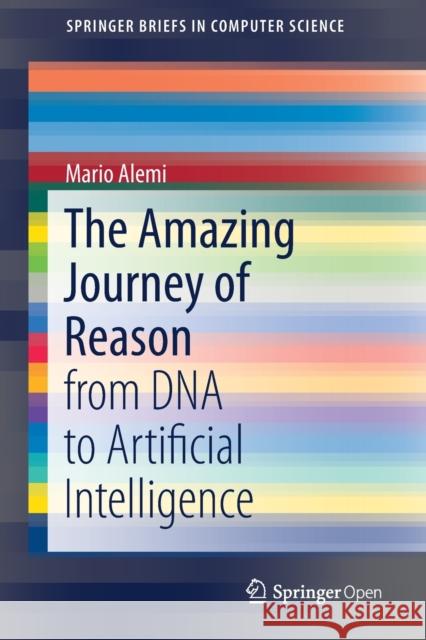The Amazing Journey of Reason: From DNA to Artificial Intelligence » książka



The Amazing Journey of Reason: From DNA to Artificial Intelligence
ISBN-13: 9783030259617 / Angielski / Miękka / 2019 / 113 str.
The Amazing Journey of Reason: From DNA to Artificial Intelligence
ISBN-13: 9783030259617 / Angielski / Miękka / 2019 / 113 str.
(netto: 76,64 VAT: 5%)
Najniższa cena z 30 dni: 77,07
ok. 22 dni roboczych.
Darmowa dostawa!
Acknowledgments
Skipping Math
Chapter 1. Life, Energy and Information
What is Life?
The Decay Towards Equilibrium
Energy Extraction Requires Information
Defining Information
Information Storage Requires Energy
Storing Information
Chapter 2. From the Big Bang to living cells
Intelligent Systems
Ex-nihilo Energy and Information
The Emergence of Complexity
Life without Selection
The Startups of Life
Amino Acids – the Entrepreneurs of Life
The Secret of Life
Evolution through Learning
Artificial Neural Networks and DNA
Collaboration and Eukaryotes
The Importance of Scientific Revolutions
Chapter 3. From Complex Organisms to Societies
Intelligence Needs Energy
Sleep, Death and Reproduction
The Limits of Unicellular Organisms
From Interaction to Cognitive Processes
Nervous System or the Forgotten Transition
First Brains and Shallow Neural Networks
Societies and Natural Selection
Insects and Intelligent SocietiesThe Social Body
Chapter 4. The Human Social Brains
Why a more Powerful Brain?
The Primates' Brain
What Makes a Homo
The Anatomy of Language
Agriculture and Cognitive Social Networks
Empires and Networks
The Expensive-class Hypothesis
Chapter 5. The Human Meta-organism
The evolution of communication in Homo sapiens
More Communicans than Sapiens
Communications Technologies and Topologies
Internet Companies
The Evolution of Artificial Intelligence
Appendix 1. More on Networks and Information
Physicists don't like Networking
Abby Normal DistributionsNetworks and Power
The Emergence of Small-world Networks
Entropy of NetworksBarabasi-Albert small-world networks
Why Power Law Appears in Networks
Code snippet: entropy of scale-free networks
Appendix 2. Math and real life
Two scientists playing roulette
Complexity in Numbers
Appendix 3. How Artificial Neural Networks Work
References
Mario holds a PhD in physics, with a passion for Artificial Intelligence, writing, and travelling. After 8 years of scientific research, mainly at CERN, Geneva, he graduated in International Journalism at City University in London. Thanks to that, he was able to fulfill his three passions for a few years –teaching Quantitative Methods at ESCP (Ecole Superieure de Commerce de Paris), shooting documentaries in Brazil, Yemen and India, writing for various publications (including the Economist and the Financial Times) and consulting with various companies on AI-related project.
This Open Access book explores questions such as why and how did the first biological cells appear? And then complex organisms, brains, societies and –now– connected human societies? Physicists have good models for describing the evolution of the universe since the Big Bang, but can we apply the same concepts to the evolution of aggregated matter –living matter included? The Amazing Journey analyzes the latest results in chemistry, biology, neuroscience, anthropology and sociology under the light of the evolution of intelligence, seen as the ability of processing information.
The main strength of this book is using just two concepts used in physics –information and energy– to explain:
- The emergence and evolution of life: procaryotes, eukaryotes and complex organisms
- The emergence and evolution of the brain
- The emergence and evolution of societies (human and not)
- Possible evolution of our "internet society" and the role that Artificial Intelligence is playing
1997-2026 DolnySlask.com Agencja Internetowa
KrainaKsiazek.PL - Księgarnia Internetowa









